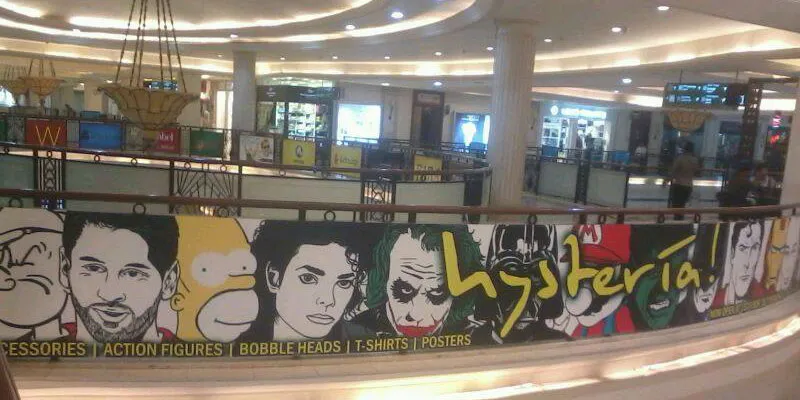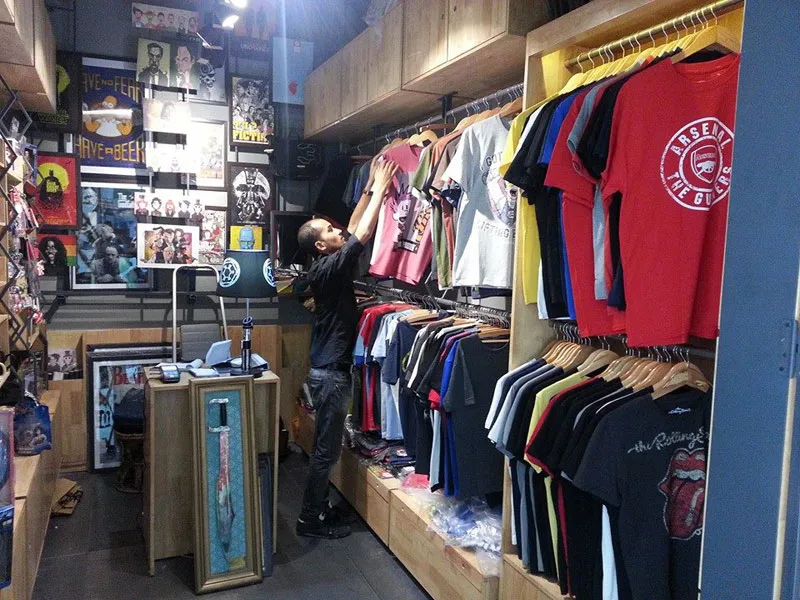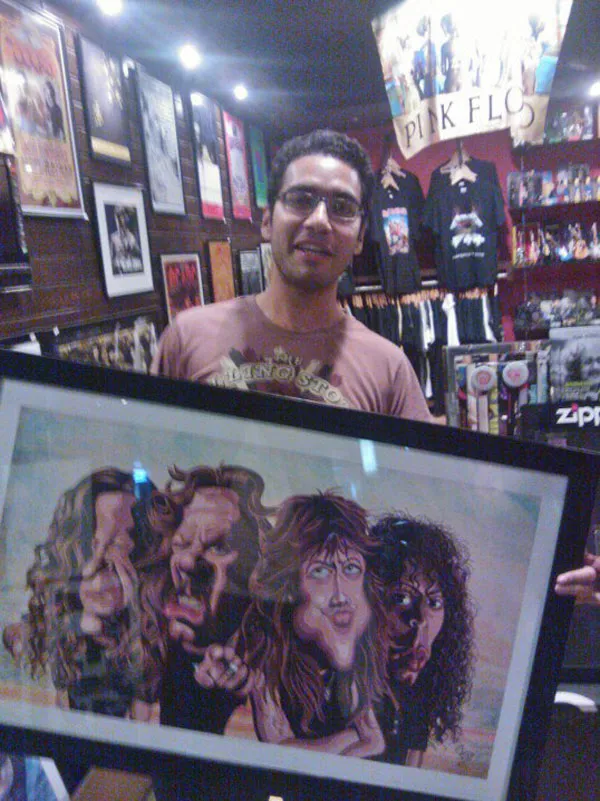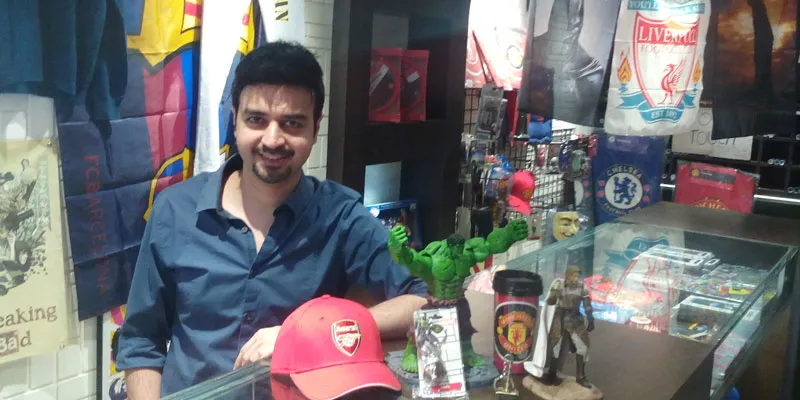How love for rock music and pop culture got two bankers to create Hysteria
The Hysteria store on Church Street is a pop culture enthusiast’s heaven; they have bobble heads, action figures, posters, t-shirts, pyjamas, you name it. “It’s fun to be a part of pop culture. I come to Hysteria whenever I come to Church Street, and its fun to pick up football gear,” says Ritesh, a software engineer.
An evening in the pub and the need do something different is what created Hysteria. Started by Vineet Sethi and Manu Singh in 2010, the duo ventured into this business because they were ‘bored’ of their mundane nine to five corporate jobs. Former bankers, Vineet and Manu originally started Hysteria as a music merchandise store. Vineet says it all happened over couple of beers.
“I had come to Bengaluru in 2007, and the music scene here is like nowhere else. I’d spend my evenings in Purple Haze, Legends of Rock and other places like Styx. Manu and I love music, and we were looking to do something of our own. A store dedicated to rock and roll music seemed a great idea; most of the merchandise was not available in India and we would source it from the West,” says Vineet.

Setting the store
Vineet and Manu first went to over 30 to 35 pubs every week to ask music enthusiasts what bands they admired the most. Then, hunting out licensed distributors in Europe and the US, the duo convinced them to look at India as a potential market. The two were sure that they wanted to bring only licensed merchandise in.
He adds that this being a unique concept, it was a little difficult to explain to people why they were quitting their lucrative jobs to look at selling merchandise. However, both of them were sure of their idea so, pooling in whatever resources they had, they set up a store on Church Street in Bengaluru.
Speaking of the days of setting up the store, Vineet says that from the time they put up their signage, 15 to 20 people would come in every day to ask if the store was ready. By the time they opened the store in June, they already had a database of over 100 people. “It seemed like a pretty insane idea at that point in time, but it paid off; in three months, we broke even. There were people in 2010 buying t-shirts that were priced at Rs 1200,” adds Vineet.

Adding pop culture ecosphere
As their customer base began to expand, people would come into the store asking for non-music related merchandise. Citing an example, Vineet says that there were times when Led Zeppelin fans would ask if they had Barcelona t-shirts.
He further says that during the first ComicCon, they set up a small store, but were sold out in the first day, and had no merchandise for the second day. So the team decided to add merchandise related to comics, movies, TV shows and other things. “It is all about target audience. If you’re a Led Zeppelin fan, you might like certain comic books, TV shows, movies and games. So we decided to expand it to encompass pop culture,” adds Vineet.
He also says that they move from one genre to the next through connecting with the consumers. After having laid the ground work for five years, they now understand their behavior very well.
Also Read: Is the comic ecosystem the next big thing in India?
Hitting the digital spaces
When the duo started Hysteria five years back, the idea was new and there was no competition as the market was very niche. “Today, the pop culture market isn’t niche in India anymore. If we take Comic Con as an example, San Diego ComicCon sees over one lakh visitors in a week. This year, Bengaluru comic con had over 40,000 visitors. It’s no longer restricted to a certain set,” adds Vineet.
In a big move this year, the team decided to move online. Their online store has been active for six months now. “One of our biggest mistakes was, possibly, being offline. But we wanted the interface and site to get better. We’ve had to be careful since we are bootstrapped; we wanted the market and the traction before going online,” adds Vineet.
Speaking of the advantages, Vineet says when they started it was a niche space, so it differentiates them from the others as they have the first-mover advantage. Apart from that, the merchandise that they sell are authentic licensed merchandise.

“I have been coming to Comic Con for awhile now, and I really liked the Hysteria store this time around. The store guy is dressed in Harry Potter gear, and the t-shirts are authentic. I have already picked up a few t-shirts for my boyfriend and myself,” said Preeti, a DC Comic enthusiast, at Comic Con this year.
Vineet adds that going online is one of the biggest plans the team has. He further adds that they do not have space to store all the merchandise they can source. Currently, there are four Hysteria stores in India – Church Street and Forum Koramangala in Bengaluru, DLF Mall Delhi and a store in Noida.
He adds that the markets in Bengaluru and Delhi are very different. While Bengaluru is big on music, Delhi is big on movies and TV shows. With the events done in Mumbai, Vineet believes that the audience in Mumbai is big on art. Currently, Hysteria makes 90 percent of its business through the offline stores and 10 percent online. “We want to reverse it,” adds Vineet.
The main regions for their online purchases are Bengaluru, Delhi, Mumbai, Hyderabad and North-East India.

Growing pop culture
When the second movie of 'The Amazing Spiderman' released last year, the worldwide merchandise retail sales it made was $1 billion. The recent 'Avengers: Age of Ultron' movie crossed the $1 billion mark. In 2013, Disney crossed close to $40.9 billion from licensed merchandise sale, of which 'Avengers' alone took close to $6 billion. Today, superheroes transcend age, gender and location. Marvel and DC, for example, which were once niche markets, are about a wider range and space of the market today.
In India, pop culture has started picking up in the past few years. According to Vineet, a big contributor of this change is the internet. He adds that the internet has created many celebrities, which in turn has created several merchandise opportunities. “Today with the internet revolution, it’s not only cities like Bengaluru, Mumbai and Delhi that embrace pop culture, but also some tier 2 and tier 3 cities,” adds Vineet.
Also Read: World War II soldier creates an Indian cartoonist by chance
Building a pop culture community
“We love pop culture. We always have. New movies to watch, or music to discover, or video games to play, are part of our daily routine, and we love the fact we have built a business around it. We see immense potential in this, as everyone needs a mean to express what they like, be it wearing the t- shirt of your favorite band, or putting up a limited edition poster of the cult movie you love on your wall, or wearing the scarf of a football club you would die for,” says Vineet.
Hysteria plans to create a whole online pop culture community. Vineet says that apart from giving just merchandise, they plan to create a whole ecosystem. He further adds that whether it is tie-ups, advertising, or building a whole community, the team is looking to add that in the Hysteria ecosystem. He also says that once a person buys one kind of merchandise from their online store, the team will send them only information related to the culture he or she supports.
“I want Hysteria to be the single destination for all pop culture enthusiasts. Whether it is music, football, comics, TV shows or movies, we want Hysteria to be a sounding board, and a source the fans come to,” adds Vineet.
The team is also planning to build flagship stores in Bengaluru, Mumbai and Delhi, where customers can come in and watch cult movies, and practice in jamming rooms, apart from just buying merchandise. Hysteria also plans to get the licenses necessary to ensure that they will no longer have to source merchandise from others. “We already know what licenses to take, and in these five years we’ve gotten a solid understanding of pulse of the market,” adds Vineet.
However, Vineet says to carry out their elaborate plans, the team currently is looking for a round of funding. “We’ve been bootstrapped so far, but for all these growth plans we currently have, it just isn’t sustainable to be self-funded.”
Cameraman : Rukmangada Raja
Video Editor : Anjali Achal
Video Reporter : Dola Samanta







